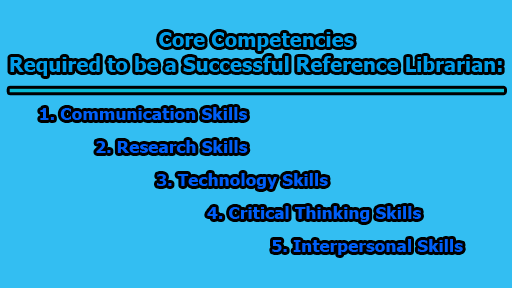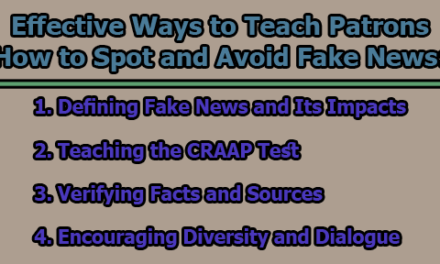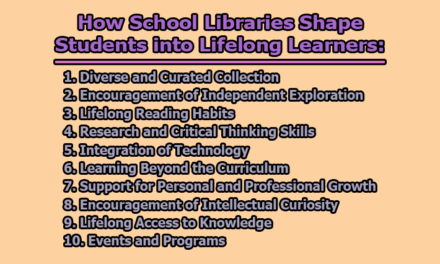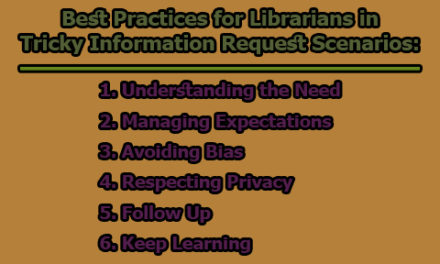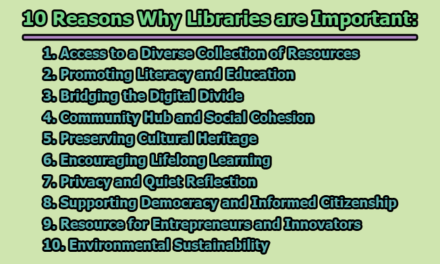Core Competencies Required to be a Successful Reference Librarian:
In today’s rapidly evolving world of information, reference librarians play a crucial role in helping patrons navigate the vast sea of knowledge. Whether you find them in academic, public, school, or special libraries, reference librarians are the information experts who assist users in finding, evaluating, and utilizing various sources of information. To excel in this multifaceted profession, one must develop a range of essential skills that enable them to meet the diverse and changing needs of their users. In this article, we’ll explore the core competencies required to be a successful reference librarian.
1. Communication Skills: Effective communication is at the heart of the reference librarian’s role. These professionals must be skilled in listening actively, asking pertinent questions, clarifying expectations, and providing clear and accurate information. The ability to adapt one’s communication style and methods to different situations, audiences, and formats is paramount. Reference librarians may engage in reference interviews in person, over the phone, or online, necessitating versatile communication strategies. They also utilize various tools and platforms such as email, chat, social media, and webinars to connect with users.
Moreover, in academic libraries, reference librarians are essential in demystifying the research process for students, often intimidated by the complexities of scholarly research. Empathy is a crucial asset, allowing reference librarians to create connections with patrons, and making the research journey less daunting.
2. Research Skills: Reference librarians must be proficient in research skills, both in conducting research themselves and in guiding patrons through the research process. They should be well-versed in the sources, tools, and methods available within their field and beyond. Identifying, locating, accessing, evaluating, and synthesizing information from diverse formats and genres is an integral part of their role. Teaching patrons research skills such as formulating research questions, selecting appropriate keywords, using search strategies, citing sources, and avoiding plagiarism is also essential.
3. Technology Skills: In the age of information technology, reference librarians must be comfortable and confident in using and learning new technologies. They must be proficient in various software and applications for managing, organizing, and disseminating information. Familiarity with a range of devices and equipment, such as scanners, printers, copiers, tablets, e-readers, and cameras, is necessary. Staying informed about the latest trends and innovations in information technology and understanding how these advancements affect their profession and users is critical.
4. Critical Thinking Skills: Reference librarians are information gatekeepers, and as such, they need strong critical thinking skills. They must be capable of analyzing, interpreting, and questioning information from different perspectives and contexts. Problem-solving, decision-making, and generating ideas based on information are also essential. This includes finding alternative sources, evaluating the quality and reliability of information, and suggesting new ways of presenting or using information.
5. Interpersonal Skills: Working effectively with others and building positive relationships is a fundamental aspect of a reference librarian’s job. Collaborating and cooperating with colleagues, supervisors, and partners are vital. Building connections with patrons through respectful, courteous, and professional service is equally important. Understanding and responding to the diverse and evolving needs, preferences, and expectations of users is a key interpersonal skill. Reference librarians should also be equipped to handle challenging situations, including dealing with difficult patrons, ethical dilemmas, or information gaps.
In academic, public, and school libraries, the role of reference librarians can vary, but their common thread is their commitment to facilitating access to information. In academic settings, they help students embark on research journeys, in public libraries, they serve as a source of knowledge for people from all walks of life, and in school libraries, they assist students in navigating the world of information, which increasingly includes online resources.
Furthermore, reference librarians in high schools and community colleges face the unique challenge of communicating effectively with students who have become accustomed to online learning. Empathy and adaptability are crucial as they bridge the gap between the virtual and physical worlds of knowledge.
In conclusion, reference librarians are the unsung heroes of the information world, and they require a diverse skill set to excel in their roles. These professionals must be proficient in communication, research, technology, critical thinking, and interpersonal skills to provide the best possible service to their patrons. By continuously honing these competencies, reference librarians remain invaluable resources in the ever-evolving landscape of information.

Library Lecturer at Nurul Amin Degree College

